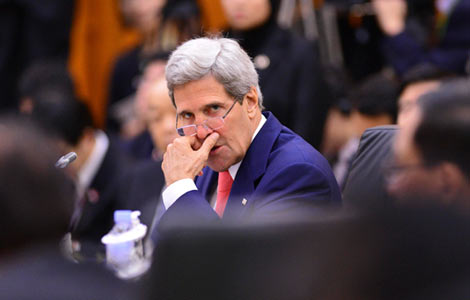Employment rate of college grads questioned
Updated: 2013-10-11 17:02
(Xinhua)
|
||||||||
BEIJING - The high employment rates of college graduates published by universities around China are being questioned, after comparisons with the lower rates reported by job markets this year.
The total number of college graduates this year hit a record high of 6.99 million, 190,000 more than the previous year. And declines in the proportion of university students with signed job contracts have been reported in Beijing, Shanghai and several provinces during this job hunting season.
However, according to the statistics of several provincial education departments, the employment rate of local graduates remains high. The education department of South China's Guangxi Zhuang autonomous region announced a rate of 88.6 percent while some eastern provinces even claimed rates higher than 90 percent.
"To maintain the high employment rate, some students who failed to find a job were asked by the school to hand in a sealed contract with any organization. But the school does not care if they really signed a job contract or not," said Jiang Kaiming, a graduate of a junior college in Shanghai.
Similar cases have been seen elsewhere. A graduate of a medical school in Guangxi said a teacher there offered him advice. "The teacher suggested I get a sealed contract with the organization that my father works for, to contribute to the employment rate," said the student, surnamed Lu.
Yang Jipei, an international security major at a junior college in East China's Jiangsu province, said he got a sealed contract from a company where he once did an internship. "I cannot drag down the employment rate of my class and my major," Yang added.
Experts believe that the need to ensure enrollment and pass assessments from educational departments puts pressure on colleges to fake employment rates.
"Despite the record-high number of graduates this year, the employment rate of many colleges remains as high as 90 percent, almost the same as the previous year," said Ye Zhiming, vice president of Shanghai University.
"The employment rate has been seen as an index for both educational departments and senior high school students to evaluate the quality of a university," Ye explained. "Some colleges take the risk of forging the rate to maintain their reputation. After all, who would want to study at a school with a declining graduate employment rate?"
The employment rate is especially crucial for second- or third-tier universities, and junior colleges, since a lower rate may lead to suspension of majors and even redundancies among teachers.
"For majors set up purely following job market demand, it became hard to survive with the saturation of the market. Sometimes employment rates were forged to save the majors," said Ye.
According to Yin Fei, associate professor of Nanjing Normal University's School of Education Science, although forgery of employment rates has been forbidden by educational departments, the policy is not strictly implemented.
To improve the evaluation system, Liu Jinhua, head of the Student Affairs Department of Fudan University in Shanghai, suggests learning from abroad.
"In some foreign universities, employment rates are taken a year after the students graduate, and the process is conducted by human resource departments or third-party organizations," Liu said. "The statistics not only include the proportion in jobs, but also the quality of employment."
For courses with declining job market demand, some experts suggest enrolling students every two years.
Most Viewed
Editor's Picks

|

|

|

|

|

|
Today's Top News
Opportunity knocks for US businesses
KFC needs new faces, not new ad campaign
China's growth rate to exceed 7.5%
US woos Malaysia in TPP talks
Nobel literature winner's work snubbed in China
Trending news across China on Oct 11
Xi ignites Australia's zeal for FTA deal
Fire at Fukuoka hospital leaves 10 dead
US Weekly

|

|















